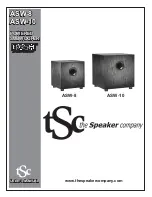
Connections
There are three connection options; two choices for preamp level inputs (LINE IN) or one for speaker level inputs (HI LEVEL IN).
Option #1
Connect the receiver’s Front
LEFT and RIGHT channel
preamp outputs to the LEFT and
RIGHT “LINE IN” RCA jacks on
the subwoofer’s amplifier panel.
Option #2
Connect the receiver’s SUB or “LFE” preamp
output to the LEFT “LINE IN” RCA jack on the
subwoofer’s amplifier panel. The inputs are
summed together internally.
Note: In this configuration, leave the cross
-
over setting at the highest frequency.
Option #3
Connect the receiver’s Front LEFT and RIGHT
speaker outputs to the LEFT and RIGHT “HI LEVEL
IN” connectors on the subwoofer’s amplifier panel.
Then, connect the front speakers as well, either to the
subwoofer connector (as shown) or at the receiver.
Note: Observe correct polarity, + to + and - to -.
Placement and Setup
When placing your new subwoofer, you may want to consider which locations yield the best results. Often this is a little trial and error,
but in general any subwoofer will produce more apparent bass when you put it in a corner. It will usually produce somewhat less bass
if you place it along a wall but away from a corner. It will produce the least bass is you place it out into a room and away from walls and
corners. Consider those tips when experimenting with placement.
Before you begin, ensure your subwoofer is hooked up properly and the controls are set at these initial settings.
• On/Auto/Standby:
On or Auto
• Phase:
0°
• Subwoofer Volume:
12 o’clock or slightly higher
•Crossover Frequency: 120 Hz (ASW-10) or 160Hz (ASW-8)
Once you’ve done this, relax! We’re not going to impose a lot of back-breaking labor as you lift your and move it from place to place,
listen, and then move it again. Rather, you’re simply going to take advantage of the fact that room resonances are bi-directional! In
other words, rather than moving the subwoofer around, place it in your listening position and YOU move around the room. Easy!
1) Place your subwoofer in your favorite chair or the primary listening position
2) Move around the room and sample locations in the corners, even those close to the floor while listening for the best sound.
3) When you hear what you think is pleasing bass, just move the subwoofer once – directly to that spot! And you’re done!
Once you’ve found the subwoofer’s “sweet spot”, you can tweak performance even more!
• Switch the Phase control to the 180° position and listen. Does the bass sound more solid and substantial? If so, leave the phase con-
trol there. Or did bass lose impact and sound more “hollow” and “thin”? If so, switch the control back to its original position.
• Use the Subwoofer Volume control to reduce subwoofer volume if the whole bass spectrum sounds overpowering compared to the
sound from the other speakers. Or turn it up a bit if those explosions or bass notes feel a bit anemic.
• Experiment with the Crossover Frequency control to fine tune the upper bass response so you’re your subwoofer and your wide range
speakers are working optimally. Read the owner’s manual for those speakers for guidance on what setting will work best. Note - if you
connected the sub using Option #2 (SUB or LFE channel output on a 5.1/7/1 receiver, leave the crossover in the highest setting.)
What you will find that in going through the setup process is that all of these adjustments interact. In other words, changing the Phase
setting may mean you’ll have to increase or reduce the Volume setting a bit, etc. Again, experimentation is the key.
Break-In
All brand new speakers require “break in” time. You’ll notice gradually improved sound, particularly in the first few weeks of use, as the
moving parts (voice coils, spiders, diaphragms, surrounds, etc.) settle and begin to work optimally together. tSc powered subwoof-
ers can play very loud for their size and power, so please be considerate of your neighbors. Note that excessive volume can damage
both your hearing and your speakers and that your factory warranty does not cover either event. If the program material ever sounds
distorted, lower the volume at once or readjust the subwoofer level.






















